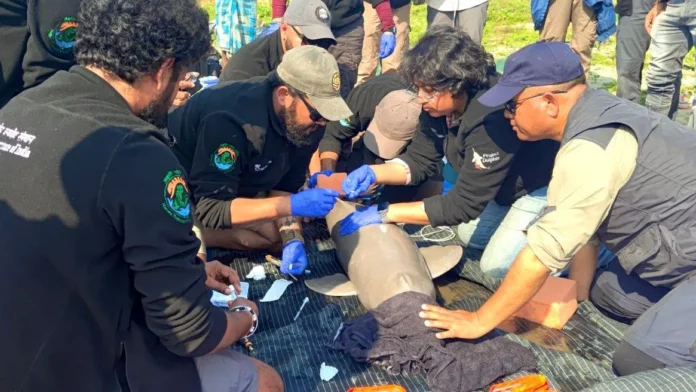GUWAHATI, Dec 19: In a groundbreaking development for wildlife conservation, India has successfully conducted the first-ever tagging of a Ganges River Dolphin (Platanista gangetica) in Assam. This historic initiative, the first of its kind globally for this endangered species, marks a significant step forward in efforts to protect and preserve the aquatic ecosystem.
Led by the Ministry of Environment, Forest and Climate Change (MoEFCC), the tagging project was implemented by the Wildlife Institute of India (WII) in collaboration with the Assam Forest Department and Aaranyak, a leading conservation organization. Financial support was provided by the National CAMPA Authority. This achievement is part of Project Dolphin, a visionary program launched by Prime Minister Narendra Modi, aimed at conserving and restoring populations of this iconic species.
The Ganges River Dolphin, India’s National Aquatic Animal, is a critical indicator of river health. Nearly blind, these dolphins rely on echolocation for navigation, feeding, and social interactions. They are primarily found in the Ganga-Brahmaputra-Meghna and Karnaphuli river systems, with India hosting approximately 90% of the global population. However, over the past century, habitat degradation, pollution, and human disturbances have severely diminished their range and numbers.
Despite their ecological importance as a keystone species, significant knowledge gaps exist regarding their movement patterns, habitat requirements, and population dynamics. Observing the species is challenging due to its brief surfacing behavior, typically lasting only 5 to 30 seconds.
To address these challenges, Project Dolphin aims to gather critical data and develop science-based conservation strategies. Under this initiative, the MoEFCC has tasked the WII with conducting extensive research across the dolphin’s range to formulate a long-term conservation action plan. The health of the Ganges River Dolphin is directly linked to the sustainability of river ecosystems and the livelihoods of communities that depend on them.
The satellite tagging operation in Assam represents a pivotal moment in achieving these goals. A healthy male dolphin was successfully fitted with a lightweight satellite tag and released back into the river under stringent veterinary supervision. Designed to have minimal impact on the dolphin’s natural behavior, the Argos satellite-compatible tags will provide essential insights into the species’ movements, habitat use, and seasonal migration patterns.
This data will be instrumental in developing targeted conservation measures, especially in river systems affected by fragmentation and human activity. By addressing these challenges, the project aims to secure the future of the Ganges River Dolphin while enhancing the health of India’s aquatic ecosystems.

